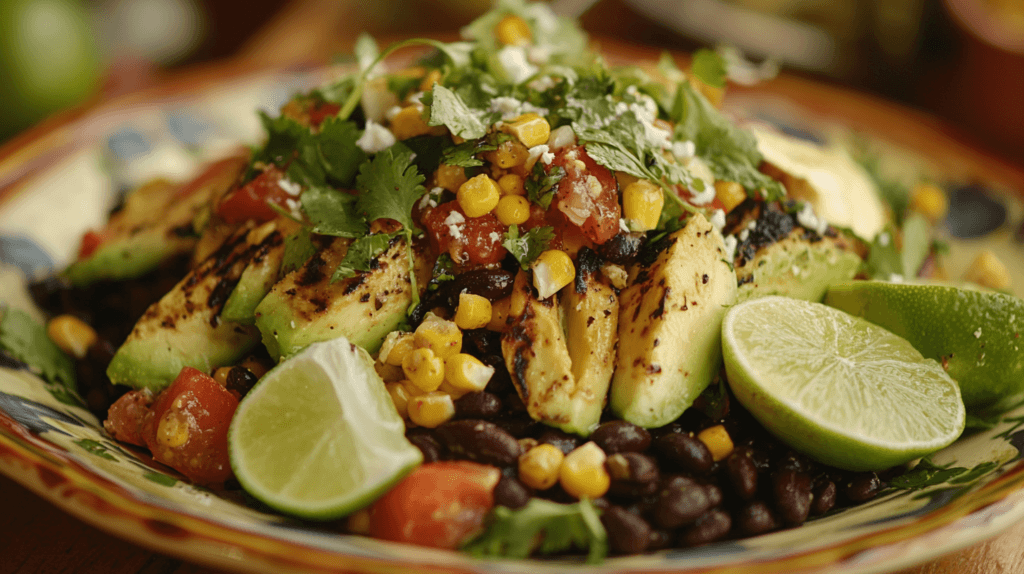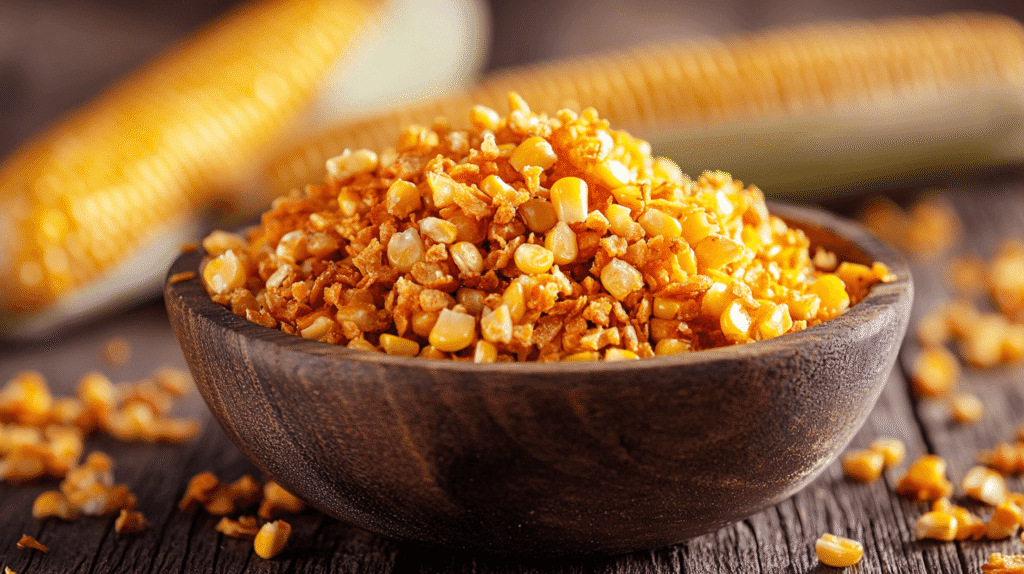Is toasted corn healthy? This question often comes to mind as more people search for nutritious and satisfying snack alternatives. Toasted corn is a crunchy and flavorful treat enjoyed globally, from traditional markets in South America to modern snack aisles in grocery stores. Its combination of satisfying texture and bold flavor has made it a popular choice among health-conscious individuals and casual snackers alike.
But is it truly a healthy option? Packed with nutrients like fiber, vitamins, and antioxidants, toasted corn offers several health benefits. However, depending on how it’s prepared or consumed, it can also pose some drawbacks, like high sodium or calorie content in processed versions.
In this article, we’ll uncover everything you need to know about toasted corn, from its nutritional profile to its health benefits and potential pitfalls. Let’s dive into the details to determine whether toasted corn deserves a spot in your healthy eating plan!
Table of Contents
Nutritional Profile of Toasted Corn
Understanding whether toasted corn is healthy starts with examining its nutritional content. Corn, as a base ingredient, is naturally rich in several essential nutrients. But does toasting or frying it add or detract from its benefits? Let’s break it down.
Macronutrient Composition
Toasted corn is primarily made up of carbohydrates, which provide a quick source of energy. Here’s a basic breakdown:
- Carbohydrates: A single serving (about 30g) of toasted corn typically contains around 18–20g of carbohydrates. These are primarily starches, making it an excellent energy booster.
- Protein: While not a high-protein snack, toasted corn offers around 2–3g of protein per serving, contributing modestly to your daily protein intake.
- Fats: Depending on how it’s prepared, toasted corn can contain up to 5g of fat, especially if fried or cooked with oil. Homemade versions with minimal oil will have a lower fat content.
Essential Vitamins and Minerals
Toasted corn retains many of the nutrients found in raw or fresh corn, including:
- Vitamin B3 (Niacin): Crucial for energy metabolism and healthy skin.
- Magnesium: Important for muscle and nerve function.
- Phosphorus: Aids in building strong bones and teeth.
- Iron: Essential for oxygen transport in the blood.
Although the toasting process may reduce some heat-sensitive nutrients like Vitamin C, the remaining minerals make it a valuable addition to your diet.
Fiber Content in Toasted Corn
One of the standout nutritional benefits of toasted corn is its fiber content. A single serving provides about 2–3g of fiber, which is important for digestive health. Fiber helps keep you full, supports regular bowel movements, and may reduce the risk of heart disease.
Health Benefits of Toasted Corn
Toasted corn isn’t just tasty—it can be surprisingly nutritious when consumed in moderation. Below, we’ll explore the main health benefits of this popular snack and how it can fit into a healthy diet.
Boosts Digestive Health
One of the most significant advantages of toasted corn is its fiber content. Fiber is essential for maintaining a healthy digestive system, promoting regular bowel movements, and preventing constipation. The fiber in toasted corn also helps nourish beneficial gut bacteria, which play a crucial role in overall health, including immunity and nutrient absorption.
Adding fiber-rich foods like toasted corn to your diet can also reduce the risk of developing digestive disorders such as diverticulitis or irritable bowel syndrome (IBS).
Provides a Good Source of Energy
Toasted corn is packed with carbohydrates, which are your body’s primary energy source. Whether you’re looking for a quick pre-workout snack or a boost during a long day, toasted corn can provide the energy you need to keep going. Its slow-digesting carbs can help maintain stable blood sugar levels, keeping you energized for longer periods.
This makes it an excellent choice for athletes, busy professionals, or anyone needing a quick yet nutritious snack.
Packed with Antioxidants
Corn naturally contains antioxidants like lutein and zeaxanthin, which are particularly beneficial for eye health. These compounds help protect your eyes from harmful blue light and oxidative damage, reducing the risk of conditions like cataracts and age-related macular degeneration.
Even when toasted, corn retains a significant portion of these antioxidants, making it a valuable addition to a diet focused on long-term health.
Heart Health Benefits
Toasted corn contains magnesium and potassium, two minerals that play a role in maintaining healthy blood pressure levels. Magnesium helps relax blood vessels, while potassium balances sodium levels in the body, reducing strain on the cardiovascular system.
Additionally, the fiber content in toasted corn can help lower cholesterol levels by binding to cholesterol molecules and preventing their absorption. Over time, this can reduce the risk of heart disease and stroke.
Gluten-Free Alternative for Snacks
For individuals with gluten intolerance or celiac disease, finding safe and enjoyable snack options can be challenging. Fortunately, toasted corn is naturally gluten-free, making it a great alternative to wheat-based snacks like crackers or pretzels.
However, it’s important to check packaging labels when buying pre-packaged toasted corn, as some varieties may be processed in facilities that handle gluten-containing products.
Potential Drawbacks of Toasted Corn
While toasted corn offers many benefits, there are a few considerations to keep in mind. Like most snacks, moderation is key to avoiding any negative effects.
High Caloric Density
Toasted corn can be calorie-dense, especially if it’s fried or prepared with oil. A single serving (around 30g) contains roughly 150–200 calories, which can add up quickly if you’re not mindful of portion sizes. Overeating high-calorie snacks like toasted corn can contribute to weight gain over time.
If you’re watching your calorie intake, consider making your own toasted corn at home using minimal oil or seasoning.
Excessive Salt or Additives in Packaged Varieties
Packaged toasted corn snacks often come heavily salted or flavored, which can significantly increase your sodium intake. High sodium consumption is linked to an increased risk of high blood pressure, heart disease, and kidney issues.
Flavored varieties, such as barbecue or cheese-flavored toasted corn, may also contain artificial additives, sugar, or unhealthy fats. These can diminish the overall healthiness of the snack.
Risk of Overeating Due to Crunchy Texture
Toasted corn’s addictive crunch can make it difficult to stop eating once you start. This can lead to overconsumption, especially if you’re eating straight out of the bag.
To avoid overeating, try portioning your toasted corn into small bowls or resealable containers. This will help you enjoy the snack without consuming too much in one sitting.
Is Toasted Corn Healthy? Comparison with Other Snacks

Toasted corn stands out as a healthier snack option when compared to many traditional snack foods. Let’s explore how it stacks up against popular alternatives.
Toasted Corn vs. Popcorn
Popcorn and toasted corn are both made from the same plant, but their preparation methods give them distinct nutritional profiles:
- Calories: Toasted corn is typically more calorie-dense than air-popped popcorn. A cup of air-popped popcorn contains about 30–40 calories, while a similar serving of toasted corn can contain up to 150 calories.
- Fiber: Both are good sources of fiber, but popcorn has slightly more due to its puffed nature.
- Fats: Toasted corn often has higher fat content, especially when fried, whereas popcorn prepared without butter or oil is naturally fat-free.
Verdict: If you’re looking for a low-calorie, high-fiber snack, popcorn may be the better choice. However, toasted corn offers more crunch and flavor, making it a satisfying alternative.
Toasted Corn vs. Potato Chips
When compared to potato chips, toasted corn fares better nutritionally in several ways:
- Fat Content: Potato chips are typically higher in unhealthy fats, especially trans fats, which are linked to heart disease. Toasted corn, on the other hand, has lower fat content, especially if it’s not fried.
- Fiber: Toasted corn contains more fiber, helping to keep you fuller longer, while potato chips lack significant fiber.
- Sodium: Both snacks can be high in sodium, depending on preparation. Opting for low-sodium toasted corn makes it the healthier choice.
Verdict: Toasted corn is generally a healthier alternative to potato chips, offering more fiber and fewer unhealthy fats.
Toasted Corn vs. Fresh Corn
Fresh corn and toasted corn share a similar nutrient base, but the differences lie in processing and preparation:
- Water Content: Fresh corn is rich in water, making it lower in calories per serving compared to toasted corn.
- Nutrient Retention: Fresh corn retains heat-sensitive vitamins like Vitamin C, which may be lost during the toasting process.
- Digestibility: Toasted corn’s lower water content and denser nature make it less filling than fresh corn.
Verdict: Fresh corn is ideal if you’re looking for a hydrating, nutrient-rich food. Toasted corn, however, offers convenience and a longer shelf life, making it a more practical snack option.
Tips for Choosing Healthy Toasted Corn Options
When selecting toasted corn as part of your diet, it’s essential to make informed choices to maximize its health benefits and minimize potential downsides.
Look for Low-Sodium Varieties
Sodium can quickly turn a healthy snack into a less desirable option. Many packaged toasted corn snacks are loaded with salt, so look for varieties labeled as “low sodium” or “unsalted.” This will help reduce your risk of high blood pressure and other sodium-related health issues.
Avoid Flavored or Sweetened Toasted Corn
Flavored toasted corn may seem appealing, but many varieties are coated with sugar, artificial flavorings, or unhealthy fats. Options like honey-roasted or cheese-flavored toasted corn often come with added calories and questionable ingredients.
Stick to plain toasted corn, and add your own seasonings at home, such as smoked paprika, garlic powder, or a pinch of sea salt, for a healthier alternative.
Opt for Homemade Toasted Corn
The best way to ensure your toasted corn is healthy is to make it yourself. Homemade toasted corn allows you to control the type and amount of oil, salt, and seasonings used.
Here’s a simple recipe to try:
- Preheat your oven to 375°F (190°C).
- Take 1 cup of dried corn kernels and soak them overnight in water.
- Drain and pat them dry.
- Toss the kernels with a teaspoon of olive oil and your choice of seasonings.
- Spread the kernels on a baking sheet and roast for 25–30 minutes, stirring occasionally.
- Let them cool and enjoy!
Homemade toasted corn is a delicious, customizable snack that skips the unhealthy additives found in many store-bought versions.
Incorporating Toasted Corn into a Balanced Diet

Toasted corn can be a satisfying and nutritious addition to your diet, provided it’s consumed in moderation and paired with other healthy foods. Here are some practical tips for enjoying toasted corn while maintaining a balanced and nutritious lifestyle.
Portion Control Tips
While toasted corn is a nutrient-dense snack, it’s easy to overindulge due to its crunchy, addictive texture. Stick to portion sizes of about 1 ounce (28–30g) per serving, which equates to roughly a small handful.
Use the following strategies to manage portions:
- Pre-portion Your Snack: Divide toasted corn into single-serving containers or bags to avoid eating straight from the bag.
- Pair It with a Meal: Add toasted corn as a side snack with your lunch or dinner to avoid snacking excessively between meals.
- Mindful Eating: Take the time to savor the crunch and flavor, focusing on the texture and taste rather than mindlessly munching.
Pairing Toasted Corn with Nutritious Foods
Toasted corn pairs well with other healthy ingredients, creating balanced and satisfying meals or snacks. Consider these combinations:
- With Nuts and Seeds: Create a homemade trail mix by combining toasted corn with almonds, walnuts, and sunflower seeds for a boost of healthy fats and protein.
- With Fresh Vegetables: Sprinkle toasted corn over a salad for added crunch and flavor. It works especially well in Mexican-style salads with avocado and black beans.
- With Dairy: Add toasted corn to a bowl of Greek yogurt for a unique texture and a satisfying snack that includes protein and calcium.
Toasted Corn Recipes for Healthy Snacks
Here are a few simple ways to incorporate toasted corn into your diet creatively:
- Toasted Corn Trail Mix: Combine toasted corn, unsweetened dried cranberries, and roasted pumpkin seeds. Store in an airtight container for an on-the-go snack.
- Mexican-Inspired Bowl: Add toasted corn, grilled chicken, guacamole, and a squeeze of lime over a bed of quinoa for a flavorful, nutrient-packed meal.
- Spiced Toasted Corn: Toss toasted corn with a mix of smoked paprika, cumin, and a touch of chili powder for a bold and spicy treat.
Frequently Asked Questions (FAQs)
Is Toasted Corn Good for Weight Loss?
Yes, toasted corn can support weight loss when eaten in moderation. Its fiber content promotes feelings of fullness, reducing overeating. However, homemade options like this crispy fried corn recipe allow you to better manage portion sizes and control calorie intake.
Can Diabetics Eat Toasted Corn?
Diabetics can enjoy toasted corn in moderation, but it’s important to monitor carbohydrate intake. Pairing it with protein or healthy fats helps balance blood sugar levels. To explore healthier preparation methods, consider reading how to air fry corn.
Does Toasted Corn Contain Gluten?
No, toasted corn is naturally gluten-free, making it a suitable snack for individuals with gluten intolerance or celiac disease. However, always check labels to ensure there’s no cross-contamination during processing.
How Many Calories Are in Toasted Corn?
A 1-ounce (30g) serving of toasted corn typically contains 150–200 calories. To keep calorie counts low, consider making your own using this easy air-fried corn recipe.
Is Toasted Corn a Processed Food?
Yes, toasted corn is considered a processed food because it undergoes preparation methods like toasting, frying, or roasting. However, minimally processed versions without additives or excess salt can still be a healthy option.
Conclusion
Toasted corn can be a healthy and satisfying snack when enjoyed in moderation. It offers fiber, vitamins, and antioxidants that contribute to overall wellness. For a healthier twist, consider this easy air-fried corn recipe to enjoy the benefits of toasted corn with less added fat.
Homemade options allow you to enjoy toasted corn’s crunch and flavor while managing its nutritional profile. Whether it’s sprinkled over a salad, added to trail mix, or eaten as a snack, toasted corn can be part of a balanced diet with mindful portion control.

